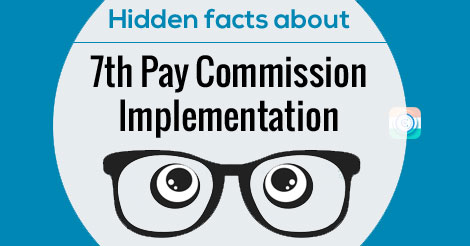X GP - 7 CPC DEF PENSIONER BASIC + Arrears (Sep to Sub Maj)
-
Stepping up of pay of Seniors drawing less pay than the Juniors consequent on fixation of pay due to implementation of 6th CPC reco...
-
NFIR write to Railway Board to settle the issue of stepping up of pay of Seniors drawing less pay than the Juniors Stepping up of pay ...
-
Central Pension Accounting Office(CPAO) published a detailed list of CPCC Bank Branches and their address, email and phone numbers. We re...
-
BHARAT PENIOSNERS SAMAJ (All India Federation of Pensioners’ Association) One notional increment to those retired on 30th June af...
-
CSD Canteen facility to Defence Family Pensioners – DDGCS letter issued on 10.3.2016 Grant of Canteen Facilities to the Family Pensioner...
-
Provision of telephone facilities and reimbursements to officers of Government of India F.No. 24(3)/E.Coord/2018 Ministry of Financ...
-
ICAR - Implementation of 7th CPC recommendations for pensioners/ Family pensioners and drawal of dearness relief as per 6th CPC ...
-
Central Government Holiday Homes – Updated List as on 11.01.2016, provided by Directorate of EstatesCentral Government Holiday Homes – Updated List as on 11.01.2016, provided by Directorate of Estates – Holiday Homes can be availed by M...
-
Ration Money Allowance should be exempt from Income Tax – 7th CPC Report Ration Money Allowance (RMA) : Ration Money Allowance (RMA)...
-
IAS (Pay) Rules, 2016 - Corrigendum MINISTRY OF PERSONNEL, P.C. AND PENSIONS (Department of Personnel and Training) CORRIGEND...
Blog Archive
-
▼
2016
(
543
)
-
▼
July
(
45
)
- X GP - 7 CPC DEF PENSIONER BASIC + Arrears (Sep to...
- 7th CPC arrears to be paid in single installment a...
- AICPIN for June 2016 – Calculation of DA from July...
- Finmin Orders regarding Fixation of Pay and Arrear...
- 12 Point Charter of Demands – General Strike 02/09...
- 7th Central Pay Commission Centre seeks states com...
- Seventh Pay Commission Gazette Notification
- 7th Pay Commission Gazette Notification - ANNEXURE II
- 7th Pay Commission Gazette Notification: PAY MATRIX
- 7th Pay Commission Gazette Notification – Publishe...
- Hidden facts about 7th Pay Commission Implementation
- CBSE chief gets additional charge of 7th Pay Commi...
- Fixation of pay of existing Group ‘D’ employees in...
- Revision of Pension: NC/JCM writes to Cabinet Secr...
- Central government sexual harassment victim employ...
- Gazette Notification for implementation of 7th CPC
- 7th Pay Commission: Check out! New salary of PRT, ...
- New Features Released For NPS Subscribers
- 7th CPC recommendations will have no impact on the...
- 7th Pay Commission: How it will change your exact ...
- 7th Pay Commission: Key things you should avoid do...
- 7th Pay Commission: Know the new salary of Assista...
- NFIR – Implementation of the recommendations of 7t...
- 7th Pay Commission allowances – Common allowances ...
- Irregularities and misuse in availing Leave Travel...
- Dissatisfaction over 7th Pay Commission Anomalies’
- Supreme Court seeks government response on ex-serv...
- ONE MORE CLARIFICATION REGARDING NJCA’s STAND ON N...
- DEFERRING OF THE INDEFINITE STRIKE – CLARIFICATIONS
- PNM meetings at the level of Railway Board - reg
- 7th Pay Commission – Even Chance for Issue of 7th ...
- CGDA: S K Kohli appointed as Controller General of...
- STRIKE IS DEFERRED, BUT THE STRUGGLE SHALL CONTINUE
- 7th CPC REPORT & NDA GOVERNMENT
- COMPARISON OF PAY between 6th Pay Commission & 7th...
- Cabinet approves Revision of pension of BSNL Pensi...
- Change of date of holiday on account of Id-ul-Fitr...
- 7th Pay Commission: central government employees n...
- What to do with 7th pay commission ‘non-bonanza’
- Defence Personnel – 7th CPC Ready Reckoner PB -1
- BPMS has decided that all the affiliated Unions wi...
- Finance Minister Promises 'Minimum Pay' 7th Pay Co...
- Status of HRA and TA in 7th CPC Salary
- NFIR clarified that there is no change on Indefini...
- Charter of demands – Indefinite Strike from 11th J...
-
▼
July
(
45
)
Powered by Blogger.


















